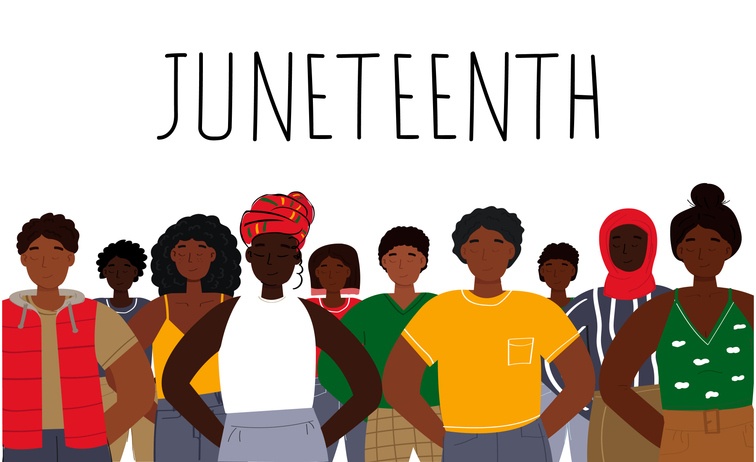
Juneteenth has been a part of the Black lived experience and cultural heritage for generations. Only recently recognized as a federal holiday, Juneteenth is a celebration of Black freedom that’s gone mainstream in a way we haven’t seen before…and frankly, I am MORE than here for it (as we all should be).
For those who aren’t in the know, let’s break it down: Juneteenth commemorates June 19, 1865 – the day the last enslaved African Americans in Galveston, Texas finally got the news that they were free, over two years after the Emancipation Proclamation was issued. Didn’t know? Slightly embarrassed…? Don’t be. This date is often left out of the history books. At its core, Juneteenth is a reminder that the journey towards freedom, justice, and equity is an ongoing one – begun centuries ago, continued by today’s change-makers, and yet unfinished. Watershed moments like the summer of 2020 not only remind us of the history that led to things like the establishment of Juneteenth as a federal holiday and the continued work that is needed for progress, but it also kicked off a revival of celebrating the experience of Blackness in America…even if it meant revisiting the painful parts.
Even for me, growing up in a small city and mostly Black community in New Jersey, Juneteenth was never something that registered on my radar. In my home, we had the usual suspects: Christmas, Thanksgiving, Fourth of July – we even donned festive Kente in celebration of Kwanzaa. But June 19th came and went each year like any other day. Even my predominantly Black and justice-minded school district, which taught us countless freedom songs, had us reenact Shaka Zulu’s victories over colonial armies, and shut down the school district for a day so every student could see Denzel become Malcolm X, never mentioned Juneteenth. It honestly wasn’t until I made it to graduate school at Morgan State University, a Historically Black University in Baltimore, Maryland, that I learned about this date dedicated to honoring the true end of slavery and the real beginning of an America where everyone was legally free.
I’ve spent the last few years making up for lost time. Last week, with my daughter in tow, I went to the National Museum of African American History and Culture, (NMAAHC) for their celebration of Juneteenth. I visited with new eyes; the eyes of one watching the work that brought Black stories to light try to be systematically undone. I soaked up stories of the Buffalo Soldiers from community elders trying to keep knowledge about them and their contributions preserved for future generations. I listened to story times from authors focused on encouraging babies to embrace their history and the magic of our people’s resilience. I wrapped up my Juneteenth hosting a BBQ with friends and neighbors, sharing good food from different parts of the diaspora with even better company.
For the younger activists who continue to help propel black stories to the forefront, Juneteenth recognition represents a huge triumph over systemic racism and a celebration of Black liberation movements – past, present, and future. Reviving this celebration is critical if the next generation is going to be equipped to truly reckon with our country’s complex legacy of racism and systemic oppression. Key milestones like Juneteenth must be lifted and examined through an honest, unflinching lens for what they are, American history.
As we see political and social forces try to eradicate and change the meaning of history, particularly BLACK AMERICAN history, celebrations, institutions, workplaces, and communities are increasingly looking for substantive ways to honor this truth. It’s high time we center Juneteenth in our national narrative. It’s not just another day off work – it’s the real Independence Day, the day when America finally started living up to its promise of freedom for all. As such, let us insist on keeping all of America’s stories at the forefront. We’ve come a long way on the march towards liberation, but there’s still further to go. Knowing the fullness of our history will help light the path forward.
So, as we’ve taken to firing up grills, pouring out libations to honor this moment in history, let’s also honor and celebrate the freedom that was hard-won by the Black ancestors but also for a nation. Don’t let that be all you do to celebrate Juneteenth; let’s keep pushing for the equality and justice they dreamed of. The struggle continues, but so does Black joy and resilience. Happy Juneteenth, y’all!

Tristine Harris is a Senior Consultant working directly with OPM’s Office of Diversity, Equity, Inclusion, and Accessibility (ODEIA) where she supports various projects including government-wide DEIA Learning Communities, efforts at MSI engagement, and the Chief Diversity Executive Officers Council. Tristine was born and raised in New Jersey and earned an MA in International Studies from Morgan State University in Baltimore. Tristine is a true adventurer at heart and has lived all over the world. She is also a skilled cook that likes to create new dishes and incorporate spicy foods from her Bajan culture, such as the scorpion pepper! Other major hobbies include singing and dancing. In fact, she used to teach salsa dancing! Tristine is a fairly new mom who loves spending time with her daughter Shiloh, her family, her church and Caribbean community. She actively participates as a mentor and member of several non-profits, such as Cultivate the City and College Bound (among others). She’s a recent appointee to the Associate Board of New Futures, a non-profit based in DC offering educational opportunities for rewarding careers. As a proud “people-person,” Tristine is highly motivated by DEIA efforts, learning about others, and connecting people with opportunities for development.